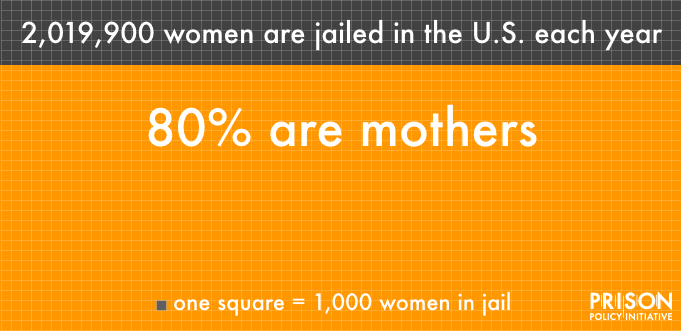Prisons and jails will separate millions of mothers from their children in 2021
The most important statistics about the incarceration of mothers and pregnant women.
by Wanda Bertram and Wendy Sawyer, May 5, 2021
This report is has been updated with a new version for 2022.
This Mother’s Day — as the COVID-19 pandemic continues to put people behind bars at serious risk — nearly 150,000 incarcerated mothers will spend the day apart from their children.1 Over half (58%) of all women in U.S. prisons are mothers, as are 80% of women in jails, including many who are incarcerated awaiting trial simply because they can’t afford bail.
Most of these women are incarcerated for non-violent offenses. Most are also the primary caretakers of their children, meaning that punishing them with incarceration tears their children away from a vital source of support. And these numbers don’t cover the many women who will become mothers while locked up this year: An estimated 58,000 people every year are pregnant when they enter local jails or prisons.2
Most incarcerated mothers are locked up in local jails
Women incarcerated in the U.S. are disproportionately in jails rather than prisons. As we’ve written before, even a short jail stay can be devastating, especially when it separates a mother from children who depend on her.
 Estimates have been rounded for this graphic. Sources: Federal Bureau of Investigation, Crime Data Explorer (2019 table “Female Arrests by Age”) and Vera Institute of Justice, Overlooked: Women in Jails in an Era of Reform.
Estimates have been rounded for this graphic. Sources: Federal Bureau of Investigation, Crime Data Explorer (2019 table “Female Arrests by Age”) and Vera Institute of Justice, Overlooked: Women in Jails in an Era of Reform.
80% of the women who will go to jail this year are mothers — including 55,000 women who are pregnant when they are admitted. Beyond having to leave their children in someone else’s care, these women will be impacted by the brutal side effects of going to jail: Aggravation of mental health problems, a greater risk of suicide, and a much higher likelihood of ending up homeless or deprived of essential financial benefits.
How incarceration — and life after incarceration — hurts mothers and their children
Women who are pregnant when they are locked up have to contend with a healthcare system that frequently neglects and abuses patients. In a 50-state survey of state prison systems’ healthcare policies, we found that many states fail to meet even basic standards of care for expectant mothers, like providing screening and treatment for high-risk pregnancies. In local jails, where tens of thousands of pregnant women will spend time this year, healthcare is often even worse (across the board) than in state or federal prisons.
More challenges await incarcerated mothers and pregnant women when they are released from jail or prison. Formerly incarcerated women experience extremely high rates of food insecurity, according to a 2019 study. And as we previously reported, the 1.9 million women released from prisons and jails every year have high rates of poverty, unemployment, and homelessness, confirming what many advocates already knew: that there is a shortage of agencies and organizations able and willing to help formerly incarcerated women restart their lives.
It’s time we recognized that when we put women in jail, we inflict potentially irreparable damage to their families. Most women who are incarcerated would be better served though alternatives in their communities.
So would their kids. Keeping parents out of jail and prison is critical to protect children from the known harms of parental incarceration, including:
- Traumatic loss marked with feelings of social stigma and shame and trauma-related stress
- More mental health problems and elevated levels of anxiety, fear, loneliness, anger, and depression
- Less stability and greater likelihood of living with grandparents, family friends, or in foster care
- Difficulty meeting basic needs for families with a member in prison or jail
- Lower educational achievement, impaired teacher-student relationships, and more problems with behavior, attention deficits, speech and language, and learning disabilities
- Problems getting enough sleep and maintaining a healthy diet
- More mental and physical health problems later in life
Incarceration punishes more than just individuals; entire families suffer the effects long after a sentence ends. Mother’s Day reminds us again that people behind bars are not nameless “offenders,” but beloved family members and friends whose presence — and absence — matters.
Footnotes
-
Based on the most recent (2016) Survey of Prison Inmates, the Bureau of Justice Statistics (BJS) estimates 57,700 women in state and federal prisons are parents of minor children. We calculated approximately 88,400 pregnant women in local jails based on the Vera Institute of Justice report’s estimate that 80% of women in jail are mothers, and the BJS reports 110,500 women in local jails at mid-year 2019 (80% of 110,500 is 88,400). While jail populations dropped quite dramatically in the early months of the COVID-19 pandemic, we opted to use the more typical 2019 jail population for our estimate because other data sources show that jail populations have largely rebounded since mid-year 2020. ↩
-
These estimates are based on the following percentages, reported in the linked sources: 4% of women admitted to state and federal prisons annually, and 3% of women admitted to local jails, are pregnant at the time of admission. The estimated 55,000 women admitted to jails while pregnant each year is based on the number of women over age 18 arrested in 2017 (over 1.7 million women), as reported in the original source. The estimated number of pregnant women admitted to state and federal prisons in a year is based on the total number of female admissions in 2019 (73,586) as reported by the Bureau of Justice Statistics CSAT — Prisoners tool. The one-day prevalence of pregnancy at year-end 2016 (as opposed to the share of annual admissions) was 0.6% in prisons and 3.5% in local jails. ↩



